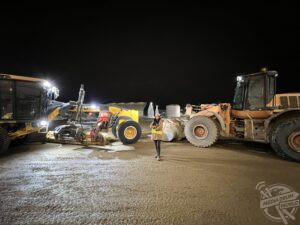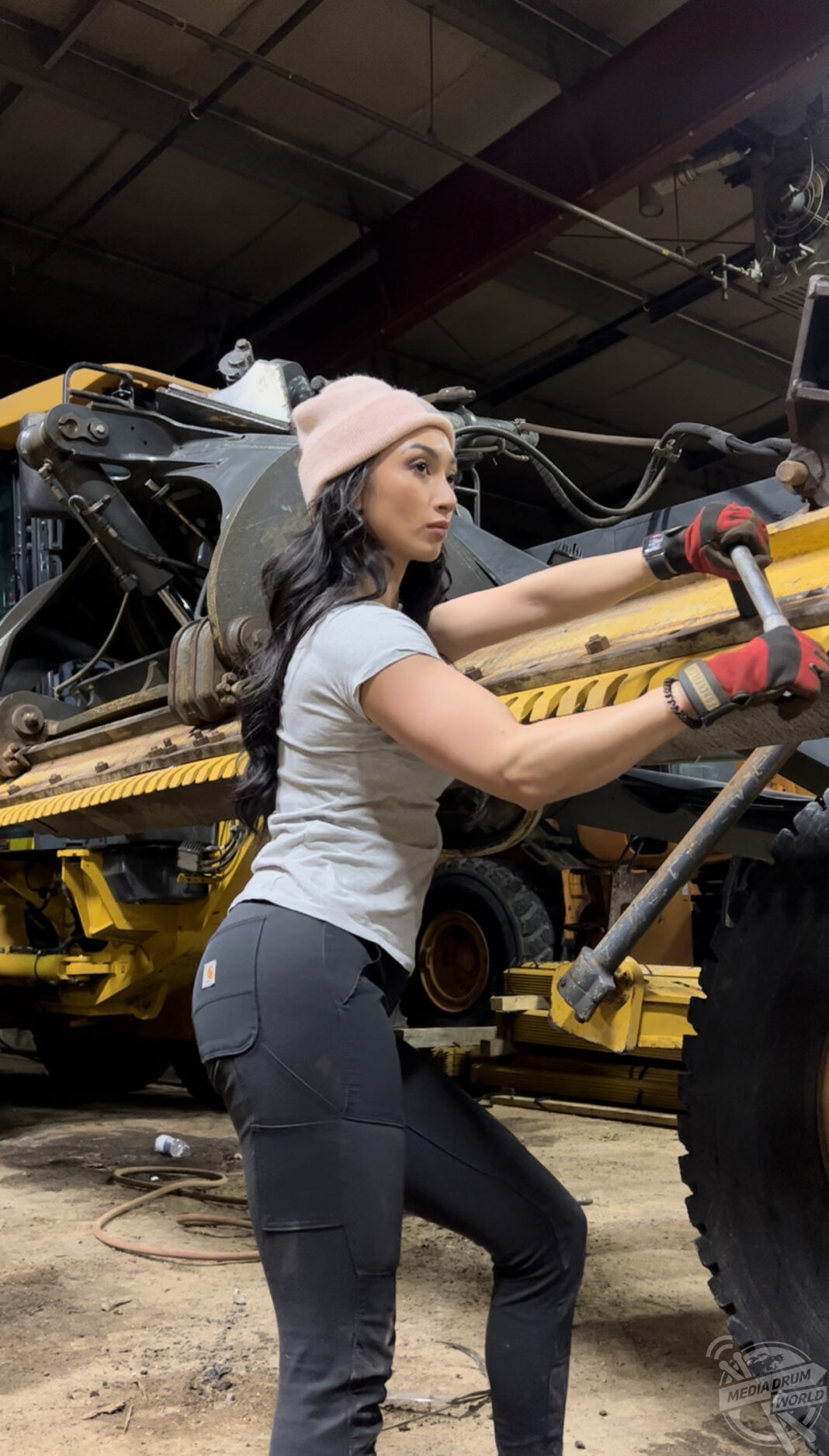By Rebecca Chitolie
THIS GLAMOROUS heavy machinery operator has revealed the racism, sexism and even physical confrontations she was forced to deal with in her battle to be taken seriously by her male boomer colleagues.
After ten years of working as a heavy equipment operator Amanda Duong (28) from Saskatoon, Canada now earns over £50K per year working in construction, now operates a JD 772 grader typically used for resurfacing road surfaces which weighs about 25 tons, with a max net power of 275 horsepower.
From the age of 18 years old Amanda spent her summer job as a labourer while she was two years into studying for a degree in biochemistry, but because she enjoyed being on a construction site so much more she decided to drop out from university and ditch her degree.
Amanda’s parents were a little upset to find out that she was ditching her biochemistry degree, but they gave her full support.
However, breaking into her role was far from easy and Amanda has shared her experiences of misogyny and abuse in the workplace which has inspired others to speak out and step into a career that they feared they would be excluded from.
During one shift, Amanda did receive abuse from a coworker. She received a call from another coworker who informed her that someone was making fun of her over a two-way radio. Amanda tuned into her two-way radio and heard the person making fun of her, calling her names such as “Amanda Dong”, “Dong” and “bean bag head” among others.
She decided to address the situation with this abusive coworker, however, the coworker was even more incensed and instigated a physical fight.

“Some of the guys treated me horribly, like I didn’t belong, and tried to bully me out of my job. Some would say some ruthless things,” said Amanda.
“There have been a few occasions where I have shown up to site in my grader and had a guy ripped my grader door open and asked what I was doing there.
“I told him I was there to do the job but would proceed to say, ‘I don’t want you here, I want a man here to do the job, not you. Why would they send a woman?’
“The guy wouldn’t let me operate, so I had to call my supervisor to explain the situation and was left with no option but to de-escalate the situation by leaving the site.
“Another incident was when I had a coworker who was being racist towards me, making fun of my last name.
“I stood up for myself by correcting him on how to say my last name properly, and to address me with some respect.
“It didn’t resonate well with him because he tried instigating a physical fight. Thankfully I had some co-workers who stood up for me and deescalated the situation.”
Amanda did not see working as a tradesperson as her career path, but she found it more fulfilling than her biochemistry degree and faced her parents’ reaction.
“I went to university thinking I wanted a degree in biochemistry. I did two years of the degree, but in my third year I realised I didn’t want to do biochemistry, as I couldn’t see it as a fulfilling career for myself,” she said
“I didn’t want to be in a lab, and wanted something different.
“It was only supposed to be a summer time job while finishing up my studies at the university. I soon realised I enjoyed working outside a lot more than being in a lab.
“My parents were upset to know that I wasn’t going to finish my biochem degree, they thought doing trade work would be a summertime job, and it was a good idea to make some money as a student, but they didn’t see it as a future career.
“Honestly, I never thought this would be my future career, either. Throughout the ups and downs of my career journey, my parents have been a source of support, encouragement, and guidance.”
Amanda shared how being a female in a male-dominated industry throws up its own difficulties.
Over the years she has faced many challenges to being a female operator, often feeling like the “token woman”, employed to make the company look good but never really treated as an equally to her co-workers.
Luckily not all Amanda’s colleagues have been threatened by having her work alongside them.
“I’m beyond thankful for the guys who have been so welcoming and who have treated me as an equal, ultimately allowing me to grow as an operator”, said Amanda.
“It felt like such an uphill battle trying to prove that what they were doing to me wasn’t affecting me. Every day I would push myself to be better than those guys and prove that I deserved to be there just like any of them.
“I have learned to set boundaries to help prevent people from disrespecting me and establish a more professional and productive working environment around myself.
“This change has been invaluable for me and has made it easier to take on new challenges and responsibilities.
“I started sharing my story online because I wanted to challenge the dominant ideology that surrounds trades.
“There are very few women in trades and I want to break the stereotypes and stigma surrounding it. I want to encourage other women to pursue this career as well.
“When I first started in trades, I felt like I didn’t belong because of the lack of representation. I wondered what was causing this restraint and lack of diversity.
“Representation is important in society and social media. When we see someone like us, it informs our brain that we belong and shapes our perspective. Lack of representation leads to negative stereotypes and drives a lack of diversification.
“Creating diverse representation in the workplace leads to inclusive and productive work environments where everyone feels valued. We need new role models for future generations, that’s why I felt the need to share my experiences.”

“It takes strength to endure ignorance and it takes strength to know where to draw the line to speak up.
Amanda explained how there are two types of reactions she gets when people find out she is a heavy equipment operator.
“Some people are shocked and supportive or shocked and in denial because they refuse to believe someone like myself has actually been doing this for just about ten years,” she said.
“I’ve received compliments from people expressing that they are happy to see a woman operating heavy equipment.
“The messages I’ve received from parents and women I have inspired have stood out the most for me.
“I have received some direct messages from parents who are grateful for my positive influence on their daughters.
“These messages have been particularly meaningful to me.
“I have also received some direct messages from women who are considering joining the trades.
“These women have told me that my story has given them the courage to pursue trades as a career and that they feel inspired to take the leap and begin their own journey.
“Receiving these messages has been a humbling experience, and I am grateful for the positive feedback and support I’ve received. I hope my position and the privilege that I’ve gained here to speak up for others continues to inspire others.”
Amanda shared her advice for those who want to do a similar career.
“Entering trades may seem intimidating initially, but trust me, the thrill of trying something new far outweighs the fear. My advice to anyone hesitating to dive into this field is simple, don’t let apprehension hold you back, take the leap into trades”, said Amanda.
“When you approach your work with enthusiasm and dedication, it not only reflects in the quality of your output but also catches the attention of those around you.
“Don’t hesitate to ask questions and seek guidance, a willingness to learn and improve is highly valued in the trades industry.

“Remember that every expert in the trades started somewhere. Feeling uncertain initially is okay, but growth and mastery come with experience.
“Embrace the learning curve, be open to feedback, and let your passion drive you forward. By doing so, you can overcome hesitation and set yourself on a path to success in the exciting and rewarding world of trades.”










